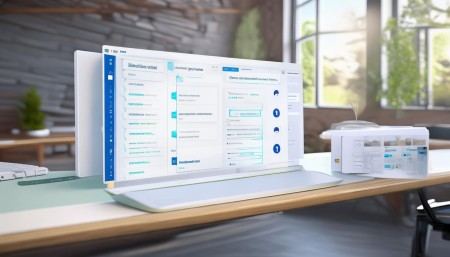
△Click on the top right corner to try Wukong CRM for free
Hey there! So, you've probably heard the term CRM thrown around a lot, right? But what does it mean in the education sector, and why is it such a big deal? Let's dive into that.
First off, when we talk about CRM, or Customer Relationship Management, in the education world, we're not just talking about managing customers. We're talking about students, parents, alumni, and even staff. It’s like having a super organized way to keep track of all the people who are part of your school community. Imagine having a digital Rolodex, but way more advanced and useful. That's kind of what a CRM system is for schools.

Now, let's think about it this way: if you were running a small business, you'd want to know everything about your customers, right? What they like, what they don't like, their preferences, and how to make them happy. Well, in education, it's no different. You want to understand your students, their needs, and how to support them better. A CRM system helps you do just that. It's like having a personal assistant who remembers every little detail about everyone in your school.
But why is this so important? Well, for starters, it makes communication a breeze. Think about it: with a CRM, you can send out personalized emails, reminders, and updates to students and parents. No more generic, one-size-fits-all messages. It's like sending a handwritten note, but in the digital age. This personal touch can make a huge difference in how connected and valued people feel.
Another big thing is that a CRM can help you track student progress. Imagine being able to see at a glance how a student is doing, what areas they might need extra help in, and even what extracurricular activities they’re involved in. It's like having a dashboard for each student, and it can be a game-changer for teachers and administrators. They can use this information to provide more targeted support and interventions, which can really make a difference in a student's academic journey.
And let's not forget about the administrative side of things. Managing a school involves a ton of paperwork, forms, and data. With a CRM, you can streamline all of that. It's like having a digital filing cabinet that organizes everything for you. Need to find a student's contact information? Boom, it's right there. Need to pull up a report on attendance? Done. It saves so much time and reduces the chances of errors, which means more time for the important stuff—like teaching and learning.
Alumni relations are another area where a CRM can shine. Schools often have a strong network of former students who can be valuable resources. A CRM can help you stay in touch with these alumni, keep them engaged, and even tap into their expertise. Maybe you want to invite an alumnus to speak at a career day, or maybe you need some advice on a new program. With a CRM, you can easily reach out and maintain those connections. It's like having a Rolodex of friends who are always ready to help.
Now, let's talk about fundraising. Many schools rely on donations and grants to support their programs and initiatives. A CRM can be a powerful tool for managing donor relationships. You can keep track of who has donated, how much, and when. You can also see who might be interested in supporting specific projects. It's like having a personal fundraiser who knows exactly who to ask and when. This can make a huge difference in the success of your fundraising efforts.
But here's the thing: a CRM isn't just about collecting data. It's about using that data to make informed decisions. For example, if you notice that a particular group of students is struggling in a certain subject, you can use that information to create targeted support programs. Or if you see that a lot of parents are asking the same questions, you can proactively address those concerns. It's like having a crystal ball that helps you anticipate and solve problems before they become big issues.
One of the coolest things about a CRM is that it can integrate with other systems. Think about it: you might already have a learning management system (LMS) for online courses, a financial system for budgeting, and a scheduling system for classes. A good CRM can connect with all of these, making it easier to manage everything from one place. It's like having a Swiss Army knife for school administration. You can do a little bit of everything, and it all works together seamlessly.
So, what are some of the key features you should look for in a CRM for education? Well, first and foremost, it should be user-friendly. If it's too complicated, no one will use it, and it won't be effective. It should also be customizable, so you can tailor it to your school's specific needs. And, of course, it should be secure. You're dealing with sensitive information, so you need to make sure it's protected. It's like having a safe for all your important documents, but one that's easy to access when you need it.

Another important feature is analytics. A good CRM should give you insights and reports that help you understand what's working and what's not. It's like having a coach who gives you feedback on your performance. You can use this information to make data-driven decisions, which can lead to better outcomes for your students and your school.
Now, I know what you might be thinking: "This all sounds great, but how do I get started?" Well, the first step is to assess your needs. What are the biggest challenges you're facing in your school? Is it communication, student support, or something else? Once you know what you need, you can start looking for a CRM that fits those needs. It's like shopping for a new car; you want to make sure it has all the features you need and that it's a good fit for your lifestyle.
Next, you'll want to involve key stakeholders. This includes teachers, administrators, and even some students and parents. Get their input on what they need and what they think would be most helpful. It's like building a team; you want everyone to be on board and excited about the new system. This will make the transition smoother and increase the chances of success.
Once you've chosen a CRM, the next step is implementation. This can be a big project, so it's important to have a plan. Start by training your staff on how to use the system. Make sure they understand its benefits and how it can make their jobs easier. It's like teaching someone to use a new piece of technology; the more comfortable they are, the more likely they are to use it effectively.
Finally, don't forget to monitor and evaluate. After you've implemented the CRM, keep an eye on how it's working. Are people using it? Is it making a difference? Gather feedback and make adjustments as needed. It's like checking in on a new diet or exercise routine; you want to make sure it's working and make changes if it's not.
In the end, a CRM in the education sector is all about improving the experience for everyone involved. It's about making communication easier, supporting students better, and streamlining administrative tasks. It's like having a superpower that helps you do your job better and make a bigger impact. And who doesn't want that?
Alright, I hope that gave you a good idea of what CRM is in the education sector and why it's so important. Now, let's wrap things up with a few questions and answers to help clarify things even more.
Q: Can a CRM system really make a difference in student outcomes? A: Absolutely! By tracking student progress, identifying areas where they need extra support, and providing personalized resources, a CRM can help improve academic performance and overall student success.

Q: How can a CRM help with parent-teacher communication? A: A CRM can make communication more efficient and personalized. You can send out tailored messages, reminders, and updates, which can help keep parents informed and engaged in their child's education.
Q: Is a CRM only useful for large schools, or can smaller schools benefit too? A: Smaller schools can definitely benefit from a CRM. In fact, it can be even more impactful because it helps manage limited resources more effectively and ensures that every student gets the attention and support they need.
Q: What should I look for when choosing a CRM for my school? A: Look for a CRM that is user-friendly, customizable, and secure. It should also offer robust analytics and be able to integrate with other systems you already use, like your LMS or financial software.
Q: How long does it take to implement a CRM in a school? A: The timeline can vary, but it typically takes a few months to fully implement a CRM. This includes planning, training, and getting everyone on board. The key is to have a clear plan and involve all stakeholders from the beginning.
I hope this helps! If you have any more questions, feel free to ask. Happy CRM-ing!
Related links:
Free trial of CRM
Understand CRM system
AI CRM Systems

△Click on the top right corner to try Wukong CRM for free